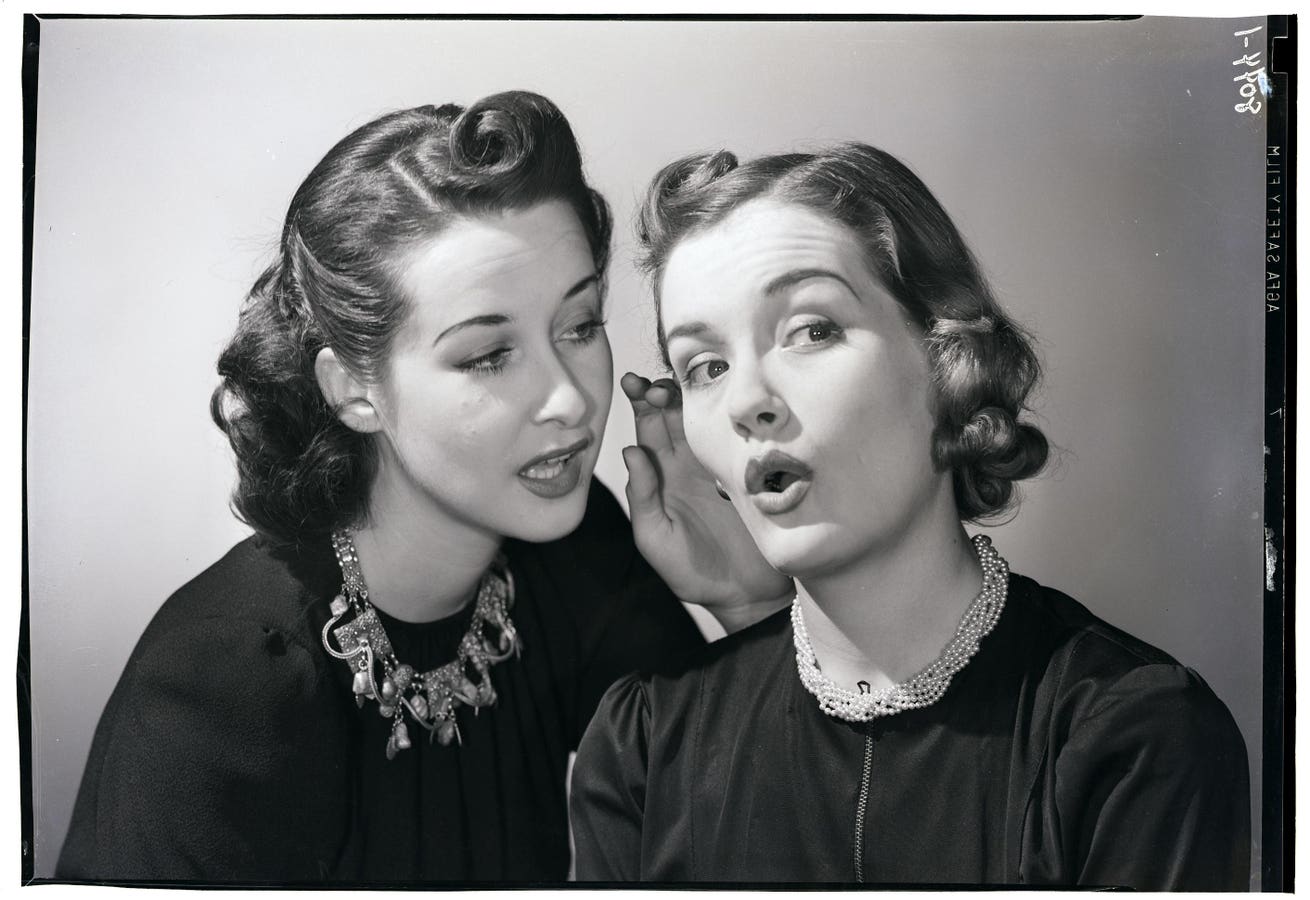(Original title) A woman reacts with interest and surprise as another woman whispers in her ear. … [+]
Entering your 20s or the “emerging adulthood” stage of life can be overwhelming and stressful. Entering your 20s or the “emerging adulthood” stage of life can be overwhelming and stressful. New research says young adults who had meaningful relationships with their friends reported higher life satisfaction than counterparts who felt their friendships were unfulfilling. After all, unlike family relationships, friendships are voluntary and mutual relationships primarily because both parties enjoy each other’s company.
“Whether they attend college, enter the workforce, or find a romantic partner, emerging adults often experience various personal turmoils. Therefore, the relationship between singleness and happiness in the emerging adult population may not be a simple continuum, ” write the researchers. “Modern emerging adults are unique in that they face a host of new pressures, including social media, online dating, income inequality, pollution, the COVID-19 pandemic, and climate change, among others.”
The team recruited 1,073 single Americans aged 19 to 24. All participants completed an online survey, which asked them to rate their levels of satisfaction with friends, family, self-esteem, and extraversion. Most of them had a close friend at the time of the study.
“Our findings are a natural extension of existing research showing that friendship is an important determinant of happiness for developing adults. Indeed, friends fulfill basic psychological and social needs, fulfill the desire to matter to others, and allow people to reinforce good events by reliving them in supportive environments,” they explained. of personality in complex ways.”
“We found that there were more men than women in the happiest profile, although our sample was predominantly female (67.6%). This differs from previous research in broader samples that suggests women are either happier than men ( or no significant difference between the two) in most countries,” the researchers added.
Previous studies have shown that adults with meaningful friendships are at a lower risk of suffering from depression, high blood pressure and heart disease. However, although most women have higher levels of intimacy with their friends and better company at age 19 than men, this intimacy diminishes during their 20s. In men, while intimacy with friends was lower during early adulthood, it became stable during their mid-to-late 20s, according to a 2022 study published in Journal of Social and Personal Relationships. In fact, between the ages of 25 and 30, best friendship traits typically begin to decline largely due to investments in romantic relationships that may result in changes in best friendship intimacy. “The decline in socializing observed after age 22 appears to reflect, in fact, the responsibilities of emerging adults,” the study authors noted.
But researchers insist it’s crucial that adults continue to prioritize meaningful friendships beyond their early 20s.
“Given the interplay between friendships, well-being, and profiles observed in our study, individuals may do well to take advantage of opportunities that arise in adulthood to form meaningful and lasting friendships with others,” the researchers concluded. The findings of the new study were published in PLUS One on October 2, 2024.
After all, unlike family relationships, friendships are voluntary and mutual relationships primarily because both parties enjoy each other’s company.
“Whether they attend college, enter the workforce, or find a romantic partner, emerging adults often experience various personal turmoils. Therefore, the relationship between singleness and happiness in the emerging adult population may not be a simple continuum, ” write the researchers. “Modern emerging adults are unique in that they face a host of new pressures, including social media, online dating, income inequality, pollution, the COVID-19 pandemic, and climate change, among others.”
The team recruited 1,073 single Americans aged 19 to 24. All participants completed an online survey, which asked them to rate their levels of satisfaction with friends, family, self-esteem, and extraversion. Most of them had a close friend at the time of the study.
“Our findings are a natural extension of existing research showing that friendship is an important determinant of happiness for developing adults. Indeed, friends fulfill basic psychological and social needs, fulfill the desire to matter to others, and allow people to reinforce good events by reliving them in supportive environments,” they explained. of personality in complex ways.”
“We found that there were more men than women in the happiest profile, although our sample was predominantly female (67.6%). This differs from previous research in broader samples that suggests women are either happier than men ( or no significant difference between the two) in most countries,” the researchers added.
Previous studies have shown that adults with meaningful friendships are at a lower risk of suffering from depression, high blood pressure and heart disease. However, although most women have higher levels of intimacy with their friends and better company at age 19 than men, this intimacy diminishes during their 20s. In men, while intimacy with friends was lower during early adulthood, it became stable during their mid-to-late 20s, according to a 2022 study published in Journal of Social and Personal Relationships.
In fact, between the ages of 25 and 30, best friendship traits typically begin to decline largely due to investments in romantic relationships that may result in changes in best friendship intimacy. “The decline in socializing observed after age 22 appears to reflect, in fact, the responsibilities of emerging adults,” the study authors noted.
But researchers insist it’s crucial that adults continue to prioritize meaningful friendships beyond their early 20s.
“Given the interplay between friendships, well-being, and profiles observed in our study, individuals may do well to take advantage of opportunities that arise in adulthood to form meaningful and lasting friendships with others,” the researchers concluded. The findings of the new study were published in PLUS One on October 2, 2024.
